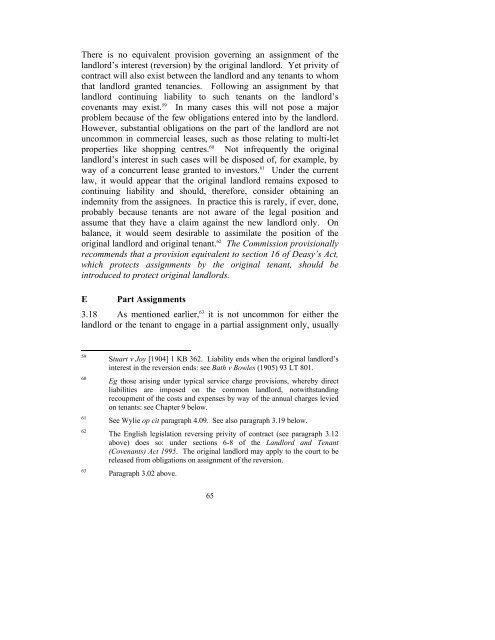Consultation Paper on the General Law of the Landlord and Tenant
Consultation Paper on the General Law of the Landlord and Tenant
Consultation Paper on the General Law of the Landlord and Tenant
Create successful ePaper yourself
Turn your PDF publications into a flip-book with our unique Google optimized e-Paper software.
There is no equivalent provisi<strong>on</strong> governing an assignment <strong>of</strong> <strong>the</strong>l<strong>and</strong>lord’s interest (reversi<strong>on</strong>) by <strong>the</strong> original l<strong>and</strong>lord. Yet privity <strong>of</strong>c<strong>on</strong>tract will also exist between <strong>the</strong> l<strong>and</strong>lord <strong>and</strong> any tenants to whomthat l<strong>and</strong>lord granted tenancies. Following an assignment by thatl<strong>and</strong>lord c<strong>on</strong>tinuing liability to such tenants <strong>on</strong> <strong>the</strong> l<strong>and</strong>lord’scovenants may exist. 59 In many cases this will not pose a majorproblem because <strong>of</strong> <strong>the</strong> few obligati<strong>on</strong>s entered into by <strong>the</strong> l<strong>and</strong>lord.However, substantial obligati<strong>on</strong>s <strong>on</strong> <strong>the</strong> part <strong>of</strong> <strong>the</strong> l<strong>and</strong>lord are notuncomm<strong>on</strong> in commercial leases, such as those relating to multi-letproperties like shopping centres. 60 Not infrequently <strong>the</strong> originall<strong>and</strong>lord’s interest in such cases will be disposed <strong>of</strong>, for example, byway <strong>of</strong> a c<strong>on</strong>current lease granted to investors. 61 Under <strong>the</strong> currentlaw, it would appear that <strong>the</strong> original l<strong>and</strong>lord remains exposed toc<strong>on</strong>tinuing liability <strong>and</strong> should, <strong>the</strong>refore, c<strong>on</strong>sider obtaining anindemnity from <strong>the</strong> assignees. In practice this is rarely, if ever, d<strong>on</strong>e,probably because tenants are not aware <strong>of</strong> <strong>the</strong> legal positi<strong>on</strong> <strong>and</strong>assume that <strong>the</strong>y have a claim against <strong>the</strong> new l<strong>and</strong>lord <strong>on</strong>ly. Onbalance, it would seem desirable to assimilate <strong>the</strong> positi<strong>on</strong> <strong>of</strong> <strong>the</strong>original l<strong>and</strong>lord <strong>and</strong> original tenant. 62 The Commissi<strong>on</strong> provisi<strong>on</strong>allyrecommends that a provisi<strong>on</strong> equivalent to secti<strong>on</strong> 16 <strong>of</strong> Deasy’s Act,which protects assignments by <strong>the</strong> original tenant, should beintroduced to protect original l<strong>and</strong>lords.E Part Assignments3.18 As menti<strong>on</strong>ed earlier, 63 it is not uncomm<strong>on</strong> for ei<strong>the</strong>r <strong>the</strong>l<strong>and</strong>lord or <strong>the</strong> tenant to engage in a partial assignment <strong>on</strong>ly, usually5960616263Stuart v Joy [1904] 1 KB 362. Liability ends when <strong>the</strong> original l<strong>and</strong>lord’sinterest in <strong>the</strong> reversi<strong>on</strong> ends: see Bath v Bowles (1905) 93 LT 801.Eg those arising under typical service charge provisi<strong>on</strong>s, whereby directliabilities are imposed <strong>on</strong> <strong>the</strong> comm<strong>on</strong> l<strong>and</strong>lord, notwithst<strong>and</strong>ingrecoupment <strong>of</strong> <strong>the</strong> costs <strong>and</strong> expenses by way <strong>of</strong> <strong>the</strong> annual charges levied<strong>on</strong> tenants: see Chapter 9 below.See Wylie op cit paragraph 4.09. See also paragraph 3.19 below.The English legislati<strong>on</strong> reversing privity <strong>of</strong> c<strong>on</strong>tract (see paragraph 3.12above) does so: under secti<strong>on</strong>s 6-8 <strong>of</strong> <strong>the</strong> <strong>L<strong>and</strong>lord</strong> <strong>and</strong> <strong>Tenant</strong>(Covenants) Act 1995. The original l<strong>and</strong>lord may apply to <strong>the</strong> court to bereleased from obligati<strong>on</strong>s <strong>on</strong> assignment <strong>of</strong> <strong>the</strong> reversi<strong>on</strong>.Paragraph 3.02 above.65
















